Ökonometrische Methoden für wirtschaftliche Prognosen und Simulationen
Der Forschungsschwerpunkt der Forschungsgruppe liegt in der Entwicklung ökonometrischer Methoden für Kurzfristprognosen (Reduzierte-Form-Modelle), für Regionalisierung und für Langfristprojektionen sowie für strukturelle Prognose- und Simulationsmodelle (DSGE-Modelle). Ferner erstellt sie ökonometrische Hintergrundanalysen für die Prognosetätigkeit der Forschungsgruppe Makroökonomische Analysen und Prognosen. Im Rahmen von Drittmittelprojekten wurden verschiedene makroökonomische Modelle, bspw. für die Volkswagen Financial Services AG oder im Rahmen von GIZ-Projekten für die Wirtschaftsministerien in Kirgistan und Tadschikistan sowie das Institut für makroökonomische Prognosen und Forschung (IFMR) in Usbekistan entwickelt.
IWH-Datenprojekt: IWH Real-time Database
Forschungscluster
Wirtschaftliche Dynamik und StabilitätIhr Kontakt

- Abteilung Makroökonomik
PROJEKTE
07.2022 ‐ 12.2026
Evaluierung des InvKG und des Bundesprogrammes STARK
Bundesministerium für Wirtschaft und Klimaschutz (BMWK)
Im Auftrag des Bundesministeriums für Wirtschaft und Klimaschutz evaluieren das IWH und das RWI die Verwendung der rund 40 Milliarden Euro, mit denen der Bund die Kohleausstiegsregionen unterstützt.
12.2024 ‐ 02.2026
Macroeconomic Modelling for Energy Investments in Vietnam
Deutsche Gesellschaft für Internationale Zusammenarbeit (GIZ) GmbH
08.2024 ‐ 03.2025
Strengthening Public Financial Management in Vietnam
Deutsche Gesellschaft für Internationale Zusammenarbeit (GIZ) GmbH
01.2023 ‐ 12.2023
Frühzeitige Ermittlung stabiler Ergebnisse zum Bruttoinlandsprodukt bzw. realen Wirtschaftswachstum und der Bruttowertschöpfung auf Länderebene
Landesbetrieb Information und Technik Nordrhein-Westfalen
Das Projekt prüft, ob die Genauigkeit der ersten Schätzung der Bruttowertschöpfung und des Bruttoinlandsprodukts für die Bundesländer erhöht und damit das Ausmaß der nachfolgenden Revisionen reduziert werden kann.
01.2018 ‐ 12.2023
EuropeAid (EU-Rahmenvertrag)
Europäische Kommission
05.2020 ‐ 09.2023
ENTRANCES: Energy Transitions from Coal and Carbon: Effects on Societies
Europäische Kommission
Ziel von ENTRANCES ist es, die Folgen des Kohleausstiegs in Europa zu untersuchen. Wie verändert der Kohleausstieg die Gesellschaft – und wie kann Politik darauf reagieren?
This project has received funding from the European Union’s Horizon 2020 research and innovation programme under grant agreement No 883947.
10.2019 ‐ 01.2023
An Klimawandel angepasste Wirtschaftsentwicklung
Deutsche Gesellschaft für Internationale Zusammenarbeit (GIZ) GmbH
Der Klimawandel wirkt sich stark auf das Wirtschaftswachstum und die Entwicklung eines Landes aus. Das erhöht den Bedarf an verlässlichen und realisierbaren Ansätzen, mit denen die Auswirkungen von Klimarisiken und potenzielle Anpassungsszenarien bewertet werden können. Die politischen Entscheidungsträger*innen in den Planungs- und Wirtschaftsministerien benötigen fundierte Prognosen, um entsprechende wirtschaftspolitische Instrumente zu konzipieren, zu finanzieren und aktiv gegenzusteuern. In den Pilotländern Kasachstan, Vietnam und Georgien werden Klimarisiken bei der makroökonomischen Modellierung berücksichtigt. Die Ergebnisse werden so in den Politikprozess integriert, dass angepasste Wirtschaftsplanungen entstehen können. Das IWH-Team ist verantwortlich für die makroökonomische Modellierung in Vietnam.
07.2016 ‐ 12.2018
Klimaschutz und Kohleausstieg: Politische Strategien und Maßnahmen bis 2030 und darüber hinaus
Umweltbundesamt (UBA)
01.2017 ‐ 12.2017
Unterstützung einer nachhaltigen Wirtschaftsentwicklung in ausgewählten Regionen Usbekistans
Deutsche Gesellschaft für Internationale Zusammenarbeit (GIZ) GmbH
01.2017 ‐ 12.2017
Short-term Macroeconomic Forecasting Model in Ministry of Economic Development and Trade of Ukraine
Deutsche Gesellschaft für Internationale Zusammenarbeit (GIZ) GmbH
01.2016 ‐ 12.2017
Entwicklung eines analytischen Tools basierend auf einer Input-Output-Tabelle
Deutsche Gesellschaft für Internationale Zusammenarbeit (GIZ) GmbH
Das Ziel des Projektes war die Entwicklung eines Exceltools zur Wirkungsanalyse von Politikmaßnahmen in Tadschikistan basierend auf dem statischen Input-Output-Ansatz.
11.2015 ‐ 12.2016
Beschäftigung und Entwicklung in der Republik Usbekistan
Deutsche Gesellschaft für Internationale Zusammenarbeit (GIZ) GmbH
Förderung einer nachhaltigen wirtschaftlichen Entwicklung in ausgewählten Regionen Usbekistans
05.2016 ‐ 05.2016
Rahmenbedingungen und Finanzierungsmöglichkeiten für die Entwicklung des Privatsektors in Tadschikistan
Deutsche Gesellschaft für Internationale Zusammenarbeit (GIZ) GmbH
02.2016 ‐ 04.2016
Makroökonomische Reformen und umwelt- und sozialverträgliches Wachstum in Vietnam
Deutsche Gesellschaft für Internationale Zusammenarbeit (GIZ) GmbH
10.2015 ‐ 03.2016
Improved Evidence-based Policy Making - GIZ Tadschikistan
Deutsche Gesellschaft für Internationale Zusammenarbeit (GIZ) GmbH
Referierte Publikationen
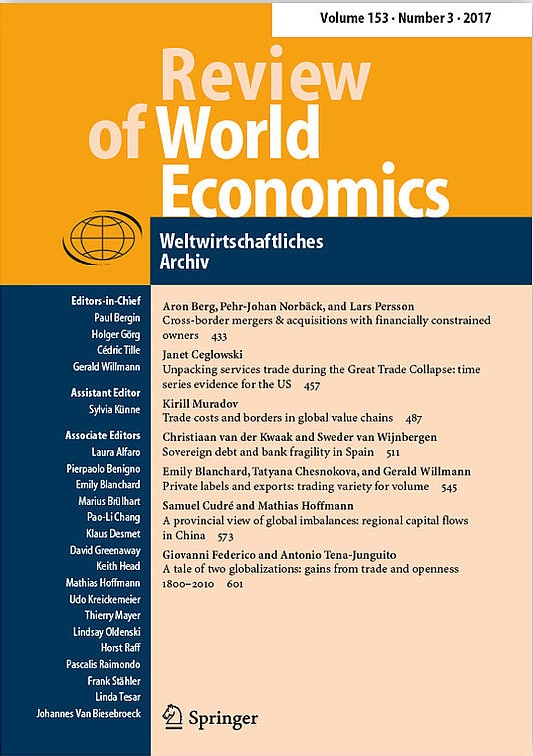
Monetary Policy in an Oil-dependent Economy in the Presence of Multiple Shocks
in: Review of World Economics, February 2023
Abstract
Russian monetary policy has been challenged by large and continuous private capital outflows and a sharp drop in oil prices during 2014. Both contributed to significant depreciation pressures on the ruble and led the central bank to give up its exchange rate management strategy. Against this background, this work estimates a small open economy model for Russia, featuring an oil price sector and extended by a specification of the foreign exchange market to correctly account for systematic central bank interventions. We find that shocks to the oil price and private capital flows substantially affect domestic variables such as inflation and output. Simulations for the estimated actual strategy and alternative regimes suggest that the vulnerability of the Russian economy to external shocks can substantially be lowered by adopting some form of inflation targeting. Strategies to target the nominal exchange rate or the ruble price of oil prove to be inferior.
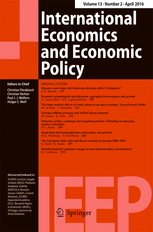
Business Cycle Characteristics of Mediterranean Economies: a Secular Trend and Cycle Dynamics Perspective
in: International Economics and Economic Policy, October 2022
Abstract
This study analyzes business cycle characteristics for all 20 major contemporaneous economies bordering the Mediterranean Sea based on annual real gross domestic product series for the period from 1960 to 2019. The region we investigate corresponds to the Mare Internum region of the Imperial Roman Empire during the Nerva-Antonine and early Severan dynasty, i.e., at the time of the maximum extent of the Roman Empire around 100 to 200 CE. The covered area encircles the Mediterranean, including economies now belonging to the European Union as well as acceding countries, Turkey, and the Middle East and North African economies. Using a components-deviation-cycle approach, we assess level trends and relative volatility of output. We also quantify the contribution of various factors to the business cycle variability within a region. We find cyclic commonalities and idiosyncrasies are related to ancient and colonial history and to contemporaneous trade relationships. Caliphate and Ottoman Empire membership as well as colonial rule in the twentieth century and contemporary Muslim share of population are the most promising predictors of business cycle commonalities in the region.
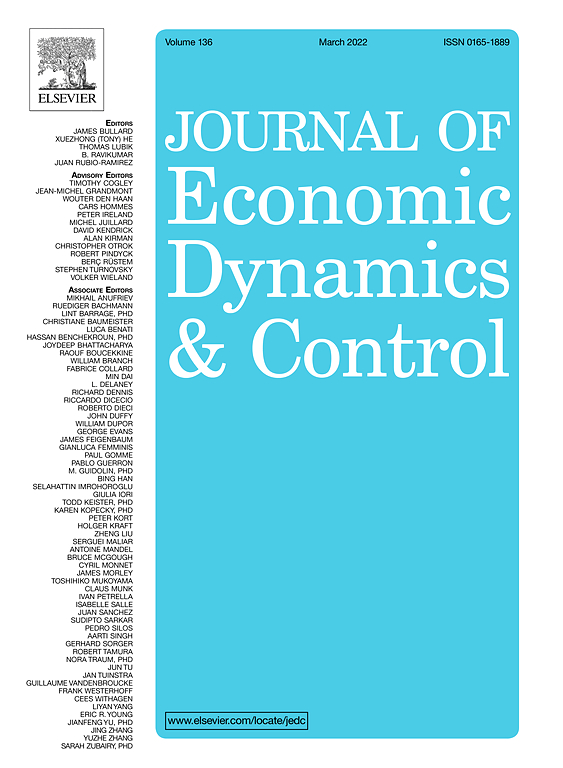
Epidemics in the New Keynesian Model
in: Journal of Economic Dynamics and Control, July 2022
Abstract
This paper documents the behavior of key macro aggregates in the wake of the Covid epidemic. We show that a unique feature of the Covid recession is that the peak-to-trough decline is roughly the same for consumption, investment, and output. In contrast to the 2008 recession, there was only a short-lived rise in financial stress that quickly subsided. Finally, there was mild deflation between the peak and the trough of the Covid recession. We argue that a New Keynesian model that explicitly incorporates epidemic dynamics captures these qualitative features of the Covid recession. A key feature of the model is that Covid acts like a negative shock to the demand for consumption and the supply of labor.
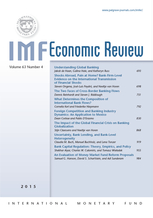
Inequality in Life and Death
in: IMF Economic Review, March 2022
Abstract
We argue that the COVID epidemic disproportionately affected the economic well-being and health of poor people. To disentangle the forces that generated this outcome, we construct a model that is consistent with the heterogeneous impact of the COVID recession on low- and high-income people. According to our model, two-thirds of the inequality in COVID deaths reflect preexisting inequality in comorbidity rates and access to quality health care. The remaining third stems from the fact that low-income people work in occupations where the risk of infection is high. Our model also implies that the rise in income inequality generated by the COVID epidemic reflects the nature of the goods that low-income people produce. Finally, we assess the health-income trade-offs associated with fiscal transfers to the poor and mandatory containment policies.
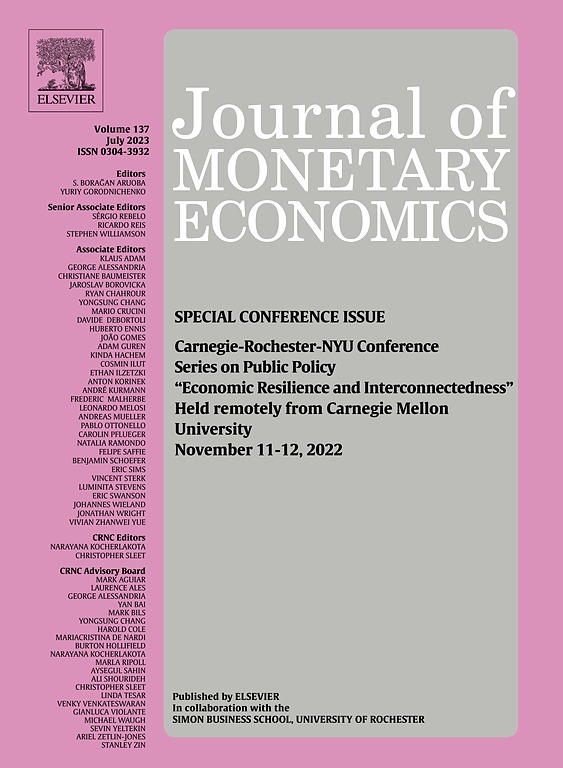
Resolving the Missing Deflation Puzzle
in: Journal of Monetary Economics, March 2022
Abstract
A resolution of the missing deflation puzzle is proposed. Our resolution stresses the importance of nonlinearities in price- and wage-setting when the economy is exposed to large shocks. We show that a nonlinear macroeconomic model with real rigidities resolves the missing deflation puzzle, while a linearized version of the same underlying nonlinear model fails to do so. In addition, our nonlinear model reproduces the skewness of inflation and other macroeconomic variables observed in post-war U.S. data. All told, our results caution against the common practice of using linearized models to study inflation and output dynamics.
Arbeitspapiere
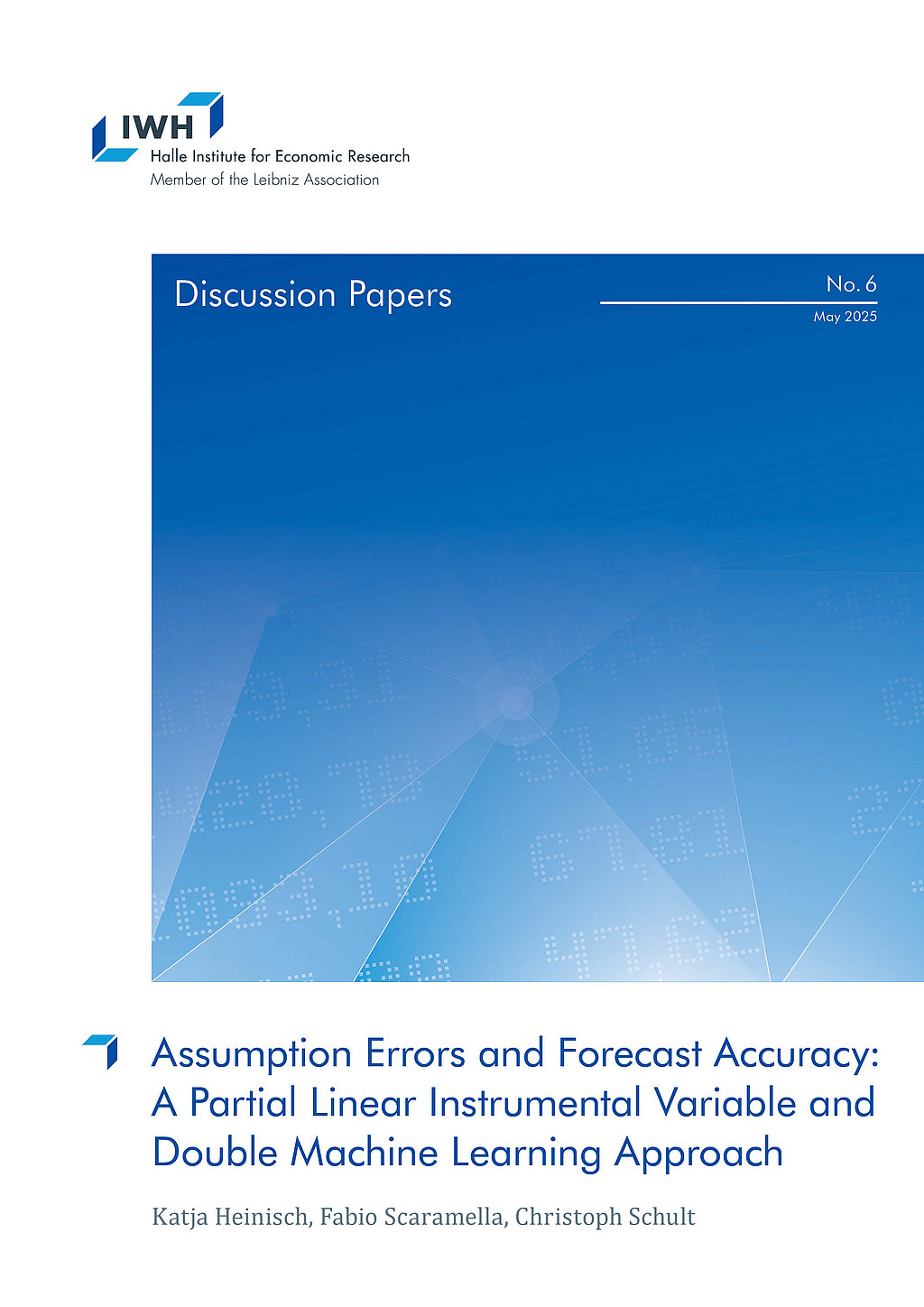
Assumption Errors and Forecast Accuracy: A Partial Linear Instrumental Variable and Double Machine Learning Approach
in: IWH Discussion Papers, Nr. 6, 2025
Abstract
<p>Accurate macroeconomic forecasts are essential for effective policy decisions, yet their precision depends on the accuracy of the underlying assumptions. This paper examines the extent to which assumption errors affect forecast accuracy, introducing the average squared assumption error (ASAE) as a valid instrument to address endogeneity. Using double/debiased machine learning (DML) techniques and partial linear instrumental variable (PLIV) models, we analyze GDP growth forecasts for Germany, conditioning on key exogenous variables such as oil price, exchange rate, and world trade. We find that traditional ordinary least squares (OLS) techniques systematically underestimate the influence of assumption errors, particularly with respect to world trade, while DML effectively mitigates endogeneity, reduces multicollinearity, and captures nonlinearities in the data. However, the effect of oil price assumption errors on GDP forecast errors remains ambiguous. These results underscore the importance of advanced econometric tools to improve the evaluation of macroeconomic forecasts.</p>

Banks and the State-Dependent Effects of Monetary Policy
in: NBER Working Papers, Nr. 33523, 2025
Abstract
<p>We show that the response of banks’ net interest margin (NIM) to monetary policy shocks is state dependent. Following a period of low (high) Federal Funds rates, a contractionary monetary policy shock leads to an increase (decrease) in NIM. Aggregate economic activity exhibits a similar state-dependent pattern. To explain these dynamics, we develop a banking model in which social interactions influence households’ attentiveness to deposit interest rates. We embed that framework within a nonlinear heterogeneous-agent NK model. The estimated model accounts well quantitatively for our key empirical findings.</p>
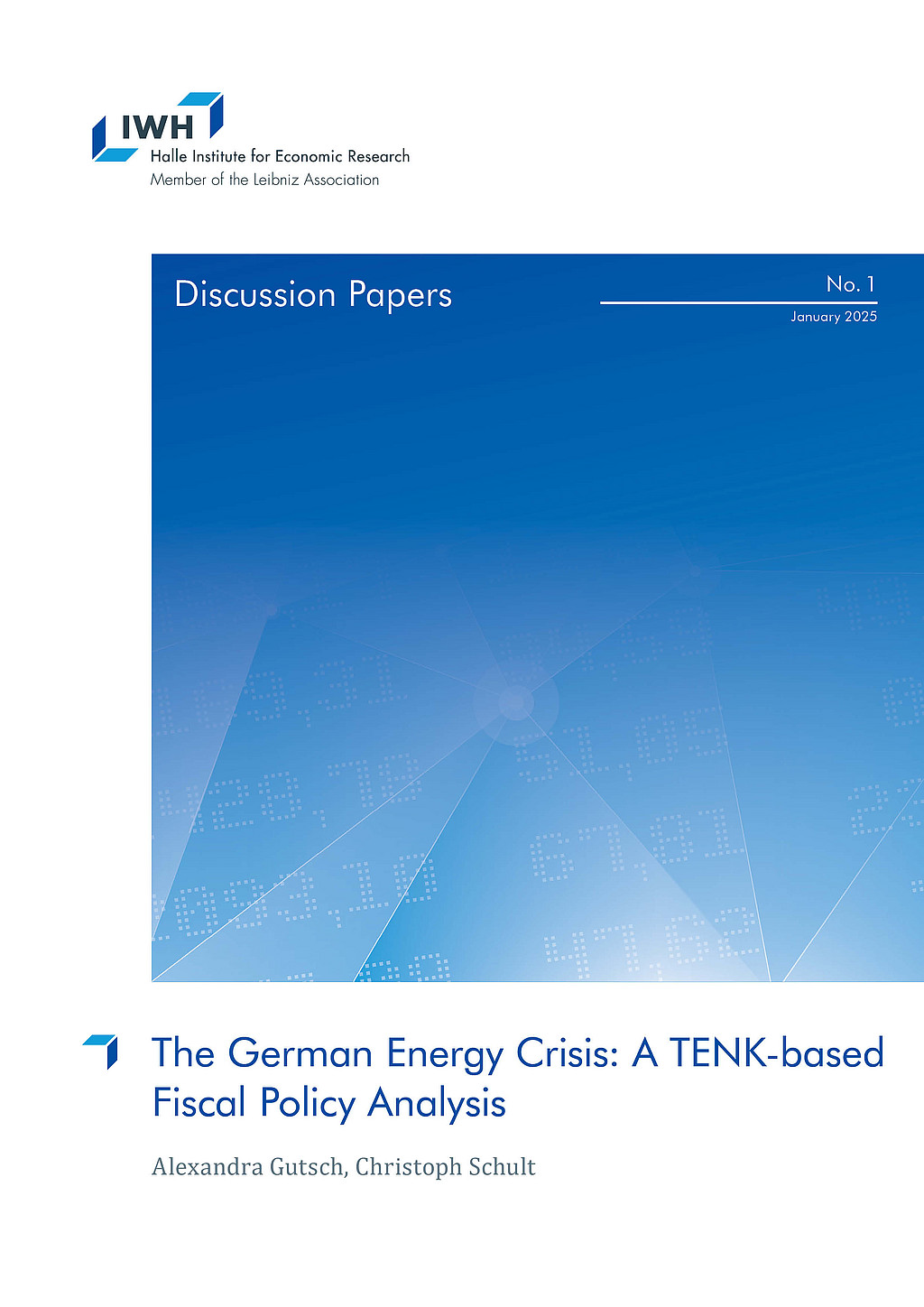
The German Energy Crisis: A TENK-based Fiscal Policy Analysis
in: IWH Discussion Papers, Nr. 1, 2025
Abstract
<p>We study the aggregate, distributional, and welfare effects of fiscal policy responses to Germany’s energy crisis using a novel Ten-Agents New-Keynesian (TENK) model. The energy crisis, compounded by the COVID-19 pandemic, led to sharp increases in energy prices, inflation, and significant consumption disparities across households. Our model, calibrated to Germany’s income and consumption distribution, evaluates key policy interventions, including untargeted and targeted transfers, a value-added tax cut, energy tax reductions, and an energy cost brake. We find that untargeted transfers had the largest short-term aggregate impact, while targeted transfers were most cost-effective in supporting lower-income households. Other instruments, as the prominent energy cost brake, yielded comparably limited welfare gains. These results highlight the importance of targeted fiscal measures in addressing distributional effects and stabilizing consumption during economic crises.</p>
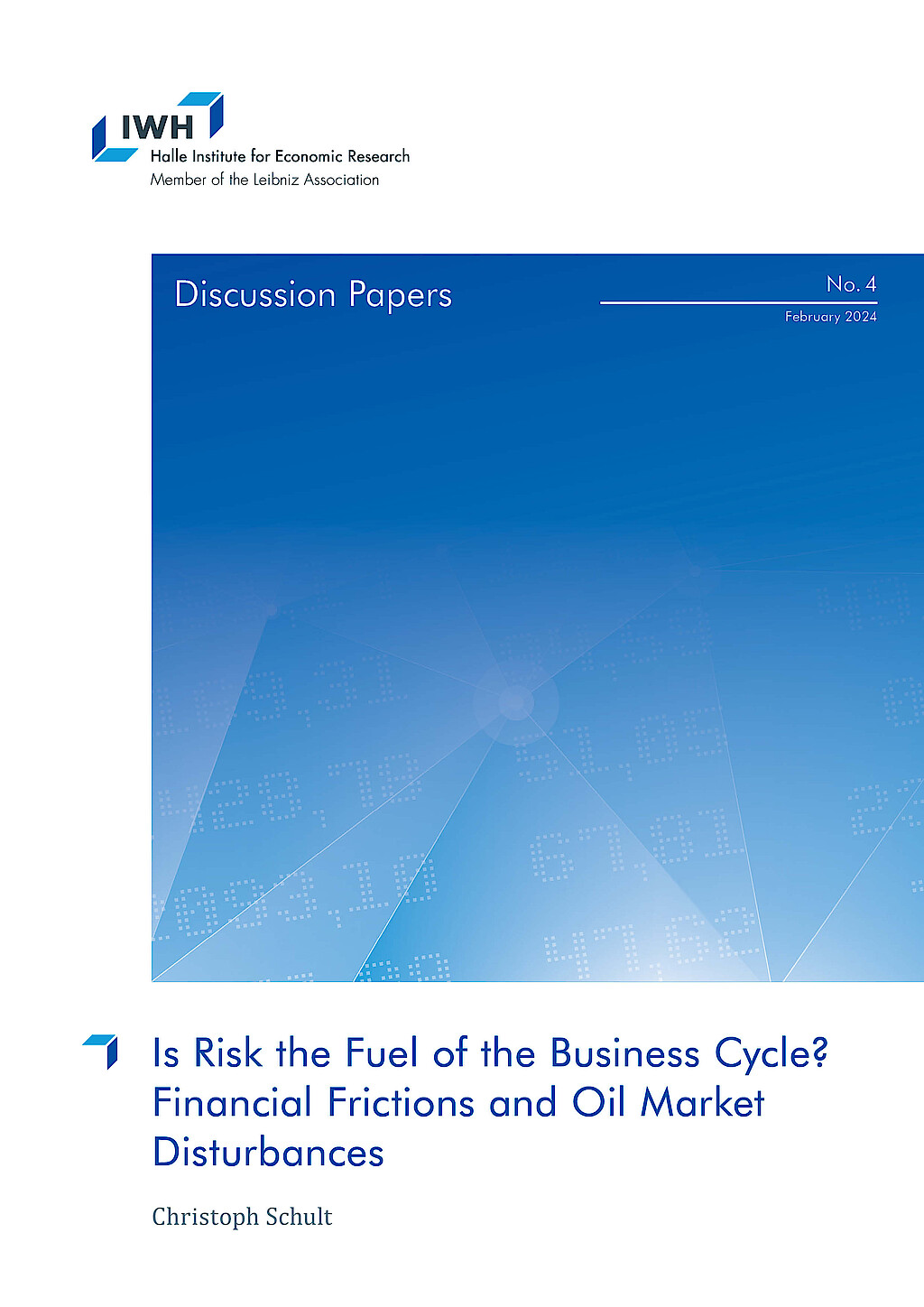
Is Risk the Fuel of the Business Cycle? Financial Frictions and Oil Market Disturbances
in: IWH Discussion Papers, Nr. 4, 2024
Abstract
I estimate a dynamic stochastic general equilibrium (DSGE) model for the United States that incorporates oil market shocks and risk shocks working through credit market frictions. The findings of this analysis indicate that risk shocks play a crucial role during the Great Recession and the Dot-Com bubble but not during other economic downturns. Credit market frictions do not amplify persistent oil market shocks. This result holds as long as entry and exit rates of entrepreneurs are independent of the business cycle.
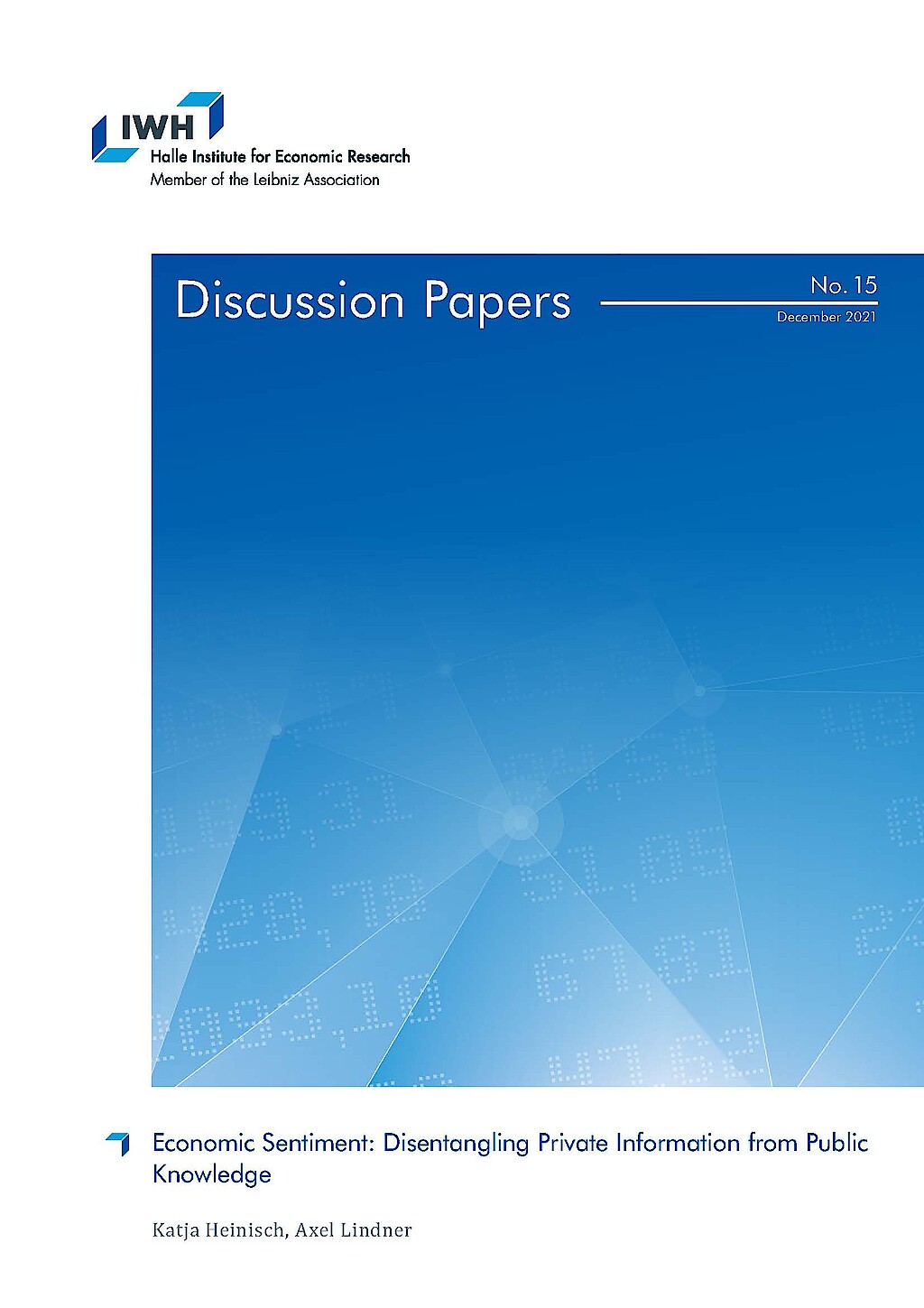
Economic Sentiment: Disentangling Private Information from Public Knowledge
in: IWH Discussion Papers, Nr. 15, 2021
Abstract
This paper addresses a general problem with the use of surveys as source of information about the state of an economy: Answers to surveys are highly dependent on information that is publicly available, while only additional information that is not already publicly known has the potential to improve a professional forecast. We propose a simple procedure to disentangle the private information of agents from knowledge that is already publicly known for surveys that ask for general as well as for private prospects. Our results reveal the potential of our proposed technique for the usage of European Commissions‘ consumer surveys for economic forecasting for Germany.


























